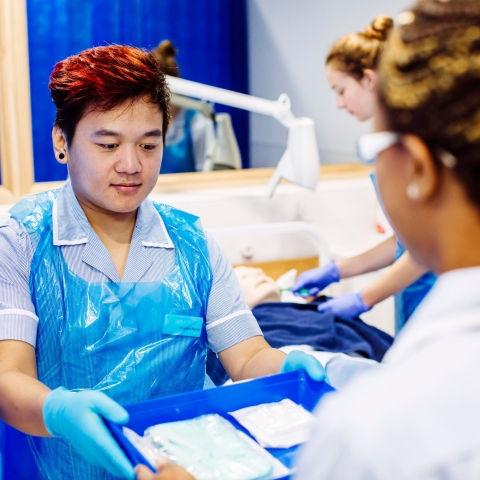
Should you consider further study?
An increasing number of students consider postgraduate or further study as an option. Undertaking further study can expand your knowledge and increase your employment prospects.
Popular reasons for undertaking further study include:
- To develop specialist expertise in an aspect of your first-degree subject
- To change direction into a new subject area and develop new skills
- To enter a profession such as teaching, social work or law for which a postgraduate course is essential
- To improve your employment prospects in areas where specialist knowledge is needed
Should I study a Master's?
Hear from current Master's students, what they consider to be the main motivators for, and benefits of studying a Master's degree.
Students should do a master’s because I feel like it's just another opportunity to learn even more and to go deeper into your area of interest.
The masters set me up for getting a higher level job after graduation, mainly due to modules that I wouldn't have otherwise learnt and their really good employability skills.
Most of the time when you go to the job market, they will always want to see what you've done, when it comes to academic education.
Being able to make yourself stand out from the crowd by not only having your bachelor's, you've also got a master's.
You've demonstrated that deeper level of learning.
You become a subject expert in your field.
You've proven that you can project manage on your own.
You've gone the extra mile.
The first time I came into the University of Portsmouth, it gave me a feeling like I was already in the industry.
I get a chance to meet mentors.
I get a chance to meet professionals and and I get a chance to learn a lot and the university itself offers a lot of opportunities for students to work on themselves and also improve themselves professionally and socially.
Since I struggle with dyslexia and dyspraxia, the University of Portsmouth can offer you so much support not just in dyslexia but with other disabilities as well.
I've received support from my course leader, from my tutors, and any question that I have has always been answered.
I really truly believe that doing a master's qualification has enabled me to have the job that I actually wanted and to get as far as I have done.
If you'd like to find out more about postgraduate study, you can come along to one of our open evenings.
There's a wealth of information on our website.
Postgraduate open events
We host a range of events, virtually and on-campus to ensure you can meet us however works best for you.
Types of courses
There are three main types of postgraduate courses available:
Taught courses lead to the award of Diplomas, Certificates or a Masters degree, such as a Master of Arts (MA) or Master of Science (MSc). The course includes modules on specific topics. You'll study at University taking part in seminars, tutorials and lectures. Courses are 1 to 2 years full time (2 to 3 years part time).
Research degrees lead to the award of Masters degree or Doctorates (PhD). The course involves in-depth study of a specific field under supervision of an experienced academic. PhD courses are 3 to 4 years full time (5 to 6 years part-time). Masters programmes by research (MA, MSc, MPhil, MRes) are 1 to 2 years full time (2 to 4 years part-time).
Professional courses lead to a qualification in a specific careers area. Examples include accountancy, law and teaching.
Where to find courses
You can search for postgraduate courses online using the following sites:
Top tip
There are a large number of courses available, so to avoid feeling overwhelmed, and to help you narrow your search, ask yourself the following questions:
- What do you hope to gain from further study?
- What are you interested in?
- Does the course attract funding?
- What are your options when you finish the course?
- Where, geographically, would you like to study?
How to apply
Most postgraduate courses don't have set closing dates, except for some vocational areas such as teaching, medicine and law. Competition for places on popular courses can be high so apply as early in your final year of study as you can.
To find out how to apply, look at each course and institution’s application process. Most ask for an application form sent directly to the institution via their own online portal. Typically you will be asked for personal information, details of your academic background, and a personal statement, outlining your suitability for the course.
Personal statements
A strong personal statement will optimise your chances of success. Your personal statement gives your reasons for wanting to do the course and shows your ability to complete the course successfully.
Each university may provide its own guidance on what to include in your personal statement, and how long it should be (typically they are around 500 words). Do your best to follow the guidelines and address all the areas they want you to cover, as failure to do this could lead to rejection – especially where competition for places is strong!
What to include in your personal statement
#1 Reasons for choosing the course
Outline your reasons for doing postgraduate study and specifically the course you've chosen. Demonstrate your enthusiasm for further study and/or research, and use examples from your previous academic study and projects to illustrate this. Focus on academic skills you've developed and wish to work on further, and also consider why you want to study at the particular institution you are applying to.
#2 Your interest in the subject
Demonstrate you are interested in the subject you are applying to - you could write about what sparked your interest in it, how you've developed this, and what you have learned in the process. Give details of any relevant work experience, extracurricular activities or academic work that backs this up, and consider which skills and experience you could bring to the course as a result.
#3 Your future career plans
If you have a clear career goal, reflect on how your course choice fits in with this - it will demonstrate strong commitment to the programme to achieve a specific outcome. Where your chosen course is of a vocational nature, this will be especially important; try to include evidence of your work experience and career exploration.

Further resources to help write your personal statement

Applying for a PhD
The application process for applying to a PhD is slightly different than applying to a Masters. Click the link below to access our specific advice on applying to PhDs.
Funding further study
Postgraduate fees and the funding options available depend on your course choice. The UK government gives loans for postgraduate study, and your institution of choice might also offer potential bursaries and scholarships to help with funding. Explore the following resources to find out more about funding your postgraduate studies:
How can I fund my Master's?
Hear from our in-house Student Finance team and current students about how to cover your tuition and living costs as a Master's student.
Studying abroad
If you're thinking of studying abroad you'll need to plan in advance. Studying in another country is an exciting prospect. To make the experience worthwhile you want to make the right choice.
- Think about where you'd like to study – find information on specific countries using the country specific information on the Prospects website
- Do your research – what's the culture or education like in that country? What entrance qualifications do you need? Will the qualification you gain be recognised in the UK?
- Do you have the language skills to succeed with overseas study or would you need to consider English-speaking universities only?
Further support
The Careers & Employability Service can support you with your plans and applications for further study. Book an appointment for:
- Deciding if further study is the right path for you and your career
- Support with the application process
- Feedback on your personal statement
- Discussing whether further study in the UK or globally would best fit with your plans
More guidance on further study
Continuing on to Master's and postgraduate study
As a current student, you can continue on to a Master's here at Portsmouth for 20% off your fees and a guaranteed conditional offer on most of our postgraduate degrees.

Graduate Entry to Medicine
Read our advice, information and resources to help you progress your career in medicine.

Enable University alerts
Turn on notifications for critical updates like closures, safety alerts, and urgent service disruptions.








